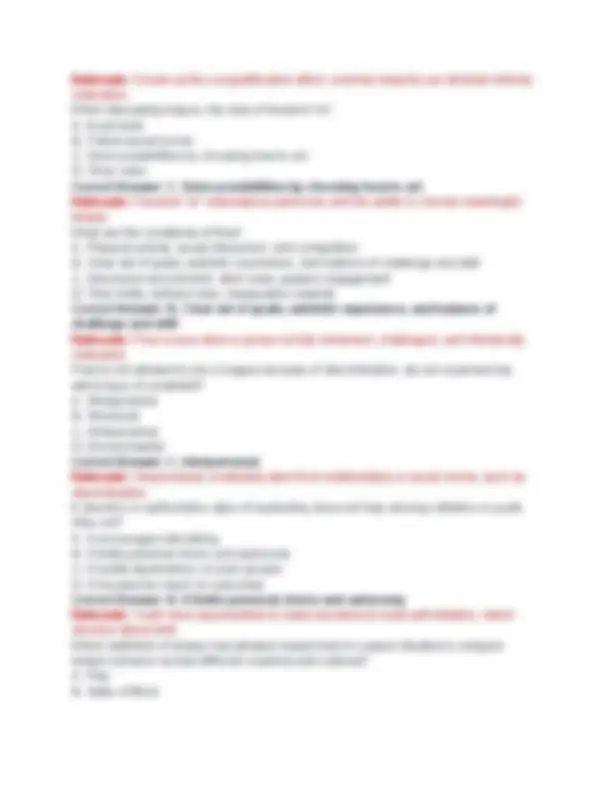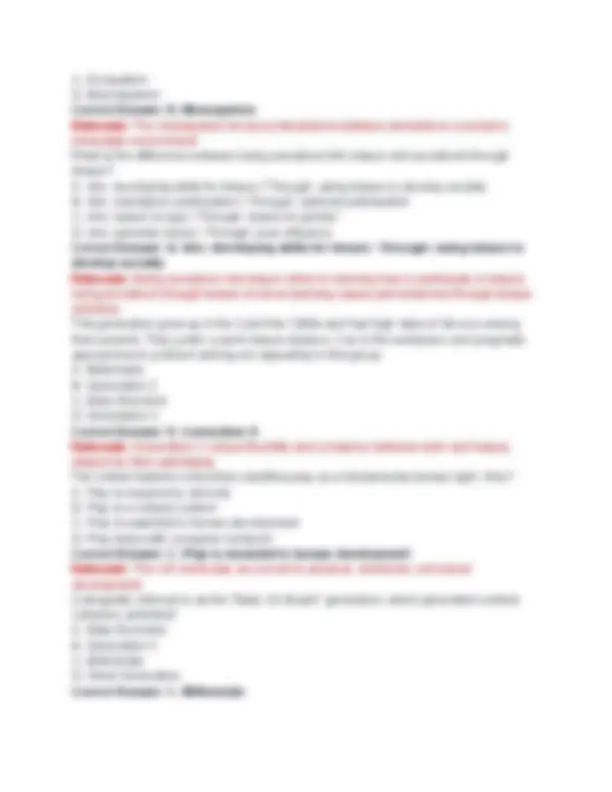
























Study with the several resources on Docsity

Earn points by helping other students or get them with a premium plan


Prepare for your exams
Study with the several resources on Docsity

Earn points to download
Earn points by helping other students or get them with a premium plan
Community
Ask the community for help and clear up your study doubts
Discover the best universities in your country according to Docsity users
Free resources
Download our free guides on studying techniques, anxiety management strategies, and thesis advice from Docsity tutors
This civilization's very evolved leisure ideal, which includes sports, arts, and learning, was restricted only to the elite "male" citizens: A. Romans B. Egyptians C. Greeks D. Chinese Correct Answer: C. Greeks Rationale: Ancient Greek leisure was reserved for elite males and focused on intellectual and cultural pursuits, excluding women and slaves. According to John Kelly's theory of types of leisure, _______________ leisure is the term that describes those leisure experiences or expressions that are freely chosen for intrinsic satisfaction. A. Compensatory B. Unconditional C. Recuperative D. Structural Correct Answer: B. Unconditional Rationale: Unconditional leisure is chosen freely and engaged in for its own sake, providing intrinsic satisfaction. How do people's perceptions of their leisure experiences change over time? A. Freedom and Constraint B. Stages and Phases C. Transitions and Trajectories D. Needs and Motivations Correct Answer: C.
Typology: Exams
1 / 30

This page cannot be seen from the preview
Don't miss anything!























This civilization's very evolved leisure ideal, which includes sports, arts, and learning, was restricted only to the elite "male" citizens: A. Romans B. Egyptians C. Greeks D. Chinese Correct Answer: C. Greeks Rationale: Ancient Greek leisure was reserved for elite males and focused on intellectual and cultural pursuits, excluding women and slaves. According to John Kelly's theory of types of leisure, _______________ leisure is the term that describes those leisure experiences or expressions that are freely chosen for intrinsic satisfaction. A. Compensatory B. Unconditional C. Recuperative D. Structural Correct Answer: B. Unconditional Rationale: Unconditional leisure is chosen freely and engaged in for its own sake, providing intrinsic satisfaction. How do people's perceptions of their leisure experiences change over time? A. Freedom and Constraint B. Stages and Phases C. Transitions and Trajectories D. Needs and Motivations Correct Answer: C. Transitions and Trajectories Rationale: People's leisure evolves based on life transitions and long-term patterns called trajectories. Iso-Ahola's concepts are most similar to those developed by? A. Maslow and Herzberg
B. Pavlov and Skinner C. Deci and Ryan D. Freud and Jung Correct Answer: C. Deci and Ryan Rationale: Iso-Ahola’s ideas about intrinsic motivation in leisure parallel Deci and Ryan’s Self-Determination Theory. Which social movement aims to challenge the epidemic of overworking and overscheduling that riddles many American adults looking for a work-life balance? A. Slow Food Movement B. Take Back Time C. Time Is Money Campaign D. Less Work, More Play Correct Answer: B. Take Back Time Rationale: This movement advocates for reclaiming free time and reducing burnout from overworking. Which idea from the life course perspective states that our lives are interdependent, and that those close to us help shape and support our behavior? A. Time Horizons B. Agency C. Linked Lives D. Role Transition Correct Answer: C. Linked Lives Rationale: The concept emphasizes that our decisions and experiences are interconnected with others. What is the name of the non-medical diagnosis spurred by the No Child Left Inside Act? A. Digital Addiction Disorder B. Nature Deficit Disorder C. Youth Apathy Syndrome D. Outdoor Aversion Syndrome Correct Answer: B. Nature Deficit Disorder Rationale: This term highlights the lack of children's exposure to nature and the consequences on well-being. Research by Ryan and Deci suggests that people will lose intrinsic satisfaction for leisure activities once they have been extrinsically rewarded for them. What does this mean? A. External rewards increase motivation B. People stop playing if they don't get paid C. Rewarding someone for something they love can reduce their interest D. People only do things if there's something in it for them Correct Answer: C. Rewarding someone for something they love can reduce their interest
C. Free Time D. Recreation Correct Answer: C. Free Time Rationale: Free time is a measurable and universal definition, making cross-cultural comparisons easier. The understanding of leisure as a "state of mind" has which benefits? A. Longer workdays B. Sense of obligation C. Happiness, pleasure, freedom, relaxation D. More income Correct Answer: C. Happiness, pleasure, freedom, relaxation Rationale: Leisure as a mindset is linked to psychological well-being, not just time or activity. Modern psychological theories view leisure as: A. Work B. Distraction C. "State of mind" D. Social obligation Correct Answer: C. "State of mind" Rationale: Psychology emphasizes the internal, subjective experience of leisure. This definition of leisure focuses on leisure that is fun, pro-social, and good for you. A. Recreation B. Work C. Freedom D. Schole Correct Answer: A. Recreation Rationale: Recreation is structured, positive, and promotes well-being and social cohesion. According to Stuart Brown's Ted Talk, what are the different types of play? A. Individual, Group, Emotional B. Rough-and-Tumble, Solitary, Exploratory C. Object Play, Social Play, Collective Play D. Competitive, Cooperative, Isolated Correct Answer: C. Object Play, Social Play, Collective Play Rationale: Brown highlights various types of play that support different aspects of development. According to Bronfenbrenner, which sphere of influence or developmental system is the interaction between interpersonal groups closest to us such as families, peers, school, and church? A. Microsystem B. Mesosystem
C. Exosystem D. Macrosystem Correct Answer: B. Mesosystem Rationale: The mesosystem involves interactions between elements in a person's immediate environment What is the difference between being socialized into leisure and socialized through leisure? A. Into: developing skills for leisure / Through: using leisure to develop socially B. Into: mandatory participation / Through: optional participation C. Into: based on age / Through: based on gender D. Into: parental choice / Through: peer influence Correct Answer: A. Into: developing skills for leisure / Through: using leisure to develop socially Rationale: Being socialized into leisure refers to learning how to participate in leisure; being socialized through leisure involves learning values and behaviors through leisure activities. This generation grew up in the Cold War 1980s and had high rates of divorce among their parents. They prefer a work-leisure balance. Fun in the workplace and pragmatic approaches to problem solving are appealing to this group. A. Millennials B. Generation Z C. Baby Boomers D. Generation X Correct Answer: D. Generation X Rationale: Generation X values flexibility and a balance between work and leisure, shaped by their upbringing. The United Nations Convention identifies play as a fundamental human right. Why? A. Play is required by schools B. Play is a cultural custom C. Play is essential to human development D. Play helps with consumer behavior Correct Answer: C. Play is essential to human development Rationale: The UN views play as crucial for physical, emotional, and social development. Colloquially referred to as the "Baby On Board" generation, which generation prefers collective activities? A. Baby Boomers B. Generation X C. Millennials D. Silent Generation Correct Answer: C. Millennials
Rationale: Huizinga’s definition of play emphasizes structure, separation from work, and intrinsic motivation. Lev Vygotsky outlined 3 characteristics of play. What are they? A. Physical, social, verbal B. Intrinsically motivated, imaginative, governed by rules C. Emotional, rule-free, competitive D. Structured, educational, quiet Correct Answer: B. Intrinsically motivated, imaginative, governed by rules Rationale: Vygotsky highlighted that play is internally driven, imaginative, and follows evolving rules. Peter Gray outlines five common characteristics of play. Which are they? A. Serious, routine, outcome-focused, team-based, physical B. Guided by adults, strict rules, goal-oriented, competitive, structured C. Self-chosen, intrinsically motivated, guided by mental rules, imaginative, active D. Timed, organized, work-like, externally motivated, passive Correct Answer: C. Self-chosen, intrinsically motivated, guided by mental rules, imaginative, active Rationale: Gray defines play as freely chosen, self-directed, mentally guided, and imaginative. Play matters because it promotes what types of development? A. Only cognitive B. Only physical and emotional C. Cognitive, physical, social, and emotional D. Just entertainment Correct Answer: C. Cognitive, physical, social, and emotional Rationale: Play contributes to well-rounded development and even helps with problem- solving and health. According to Stuart Brown’s TedTalk, what are the consequences of play deprivation? A. Higher grades and focus B. No known consequences C. Impaired brain development and depression D. Improved behavior Correct Answer: C. Impaired brain development and depression Rationale: Lack of play can negatively impact brain growth and emotional regulation. What are some types of play that develop our social skills? A. Solitary and object play B. Associative and cooperative play C. Competitive and reflective play D. Exploratory and mental play Correct Answer: B. Associative and cooperative play
Rationale: These forms involve interaction and teamwork, building communication and empathy. The Ancient Greek term _________________ literally meant having no leisure. A. Schole B. Chronos C. Arete D. Ascholia Correct Answer: D. Ascholia Rationale: “Ascholia” indicated lack of leisure, typically used for non-citizens like slaves and women. According to Goodale, what is linked to the decline of leisure? A. Better technology B. Increased health C. Time pressure and demonizing work D. Free education Correct Answer: C. Time pressure and demonizing work Rationale: Goodale noted modern society’s obsession with speed and devaluing leisure The leisure service industry will be the fourth largest producer of revenue in the economy by 2022. What industries does this include? A. Manufacturing and engineering B. Agriculture and retail C. Leisure and hospitality D. Health care and education Correct Answer: C. Leisure and hospitality Rationale: This sector includes tourism, hotels, theme parks, and related services that drive significant economic activity. What is the average amount of time that Americans spend in leisure? A. Two hours B. Eight hours C. Five hours and five minutes D. One hour Correct Answer: C. Five hours and five minutes Rationale: According to recent data, Americans average over five hours of leisure time daily. This leisure activity dominates most people’s leisure time: A. Reading B. Walking C. Watching TV D. Playing sports Correct Answer: C. Watching TV
Rationale: Recreation therapy aims to restore function; therapeutic recreation promotes meaningful leisure participation. Who was the first person to promote the idea that leisure was performed for its own sake? A. Socrates B. Plato C. Aristotle D. Huizinga Correct Answer: C. Aristotle Rationale: Aristotle viewed leisure (schole) as the highest good, pursued for its intrinsic value. This generational cohort came of age in the 1960s. These folks were your hippies, antiwar protesters, and attendees of Woodstock. They work hard and play hard and will comprise the largest senior citizen population in US history. A. Generation X B. Millennials C. Baby Boomers D. Silent Generation Correct Answer: C. Baby Boomers Rationale: Baby Boomers were born between 1946 and 1964 and heavily influenced American culture. To compete in Senior Games, you must be at least: A. 40 years old B. 50 years old C. 60 years old D. 65 years old Correct Answer: B. 50 years old Rationale: Participants in the Senior Games must be age 50 or older. The values and social norms we learn from sports and other activities are good examples of how we are: A. Socialized through leisure B. Socialized into work C. Distracted by leisure D. Trained to compete Correct Answer: A. Socialized through leisure Rationale: Leisure activities often transmit cultural values and norms. When parents introduce children to organized sports and other types of family leisure, we say that children are being: A. Encouraged to compete B. Socialized into leisure C. Prepared for education
D. Exposed to stress Correct Answer: B. Socialized into leisure Rationale: Introducing children to structured leisure teaches them how to engage in it meaningfully. Meaning of leisure for Ancient Romans: A. Work and leisure were equal B. Leisure was for women C. Leisure was earned through work D. Leisure was seen as a weakness Correct Answer: C. Leisure was earned through work Rationale: Romans believed leisure refreshed one for more work and had to be earned. Meaning of leisure for Ancient Greeks: A. Leisure was only for slaves B. Leisure was work C. Leisure was the highest good D. Leisure was entertainment Correct Answer: C. Leisure was the highest good Rationale: Greeks viewed leisure as time for self-cultivation and intellectual growth, reserved for male elites. Schole and ascholia views: A. Schole = work / Ascholia = leisure B. Schole = leisure / Ascholia = absence of leisure C. Both mean freedom D. Both mean stress Correct Answer: B. Schole = leisure / Ascholia = absence of leisure Rationale: Schole refers to philosophical leisure; ascholia to a lack of leisure (work burden). What is Goodale’s view of leisure? A. Leisure is outdated B. Leisure is selfish C. Work and leisure should be congruent D. Leisure must be earned Correct Answer: C. Work and leisure should be congruent Rationale: Goodale believed work and leisure shouldn't be in conflict and that both should provide fulfillment. What are Goodale’s suggestions for making leisure matter? A. Take more vacations B. Play video games C. Make work fulfilling, avoid debt, volunteer D. Avoid work entirely Correct Answer: C. Make work fulfilling, avoid debt, volunteer
B. Requires adult supervision and formal rules C. No material interest, has its own time/space, fixed rules, and is orderly D. Is always physical and outdoors Correct Answer: C. No material interest, has its own time/space, fixed rules, and is orderly Rationale: Huizinga emphasized that play is voluntary, rule-bound, separate from ordinary life, and not done for material gain. Lev Vygotsky, Russian Psychologist, outlined 3 characteristics of play. What are they? A. Competition, reward, structure B. Intrinsically motivated, imagination, rules C. Teamwork, instruction, obedience D. Entertainment, rest, supervision Correct Answer: B. Intrinsically motivated, imagination, rules Rationale: Vygotsky believed play is driven by intrinsic interest, fosters imagination, and involves rule-based scenarios. Peter Gray outlines five common characteristics of play. What are they? A. Competitive, physical, time-limited, passive, fun B. Self-chosen, intrinsically motivated, guided by rules, imaginative, active C. Supervised, instructed, reward-based, structured, formal D. Risky, rebellious, emotional, lonely, spontaneous Correct Answer: B. Self-chosen, intrinsically motivated, guided by rules, imaginative, active Rationale: Peter Gray’s modern theory of play describes its voluntary, creative, and mentally engaging nature. Play matters because it promotes what types of development? A. Academic only B. Physical and emotional only C. Cognitive, physical, social, and emotional development D. Mental and spiritual only Correct Answer: C. Cognitive, physical, social, and emotional development Rationale: Play contributes holistically to a child's well-being, development, and problem-solving ability. According to the Stuart Brown TedTalk, what are the consequences of play deprivation? A. Increased creativity B. Enhanced work ethic C. Impaired brain development, depression D. None Correct Answer: C. Impaired brain development, depression Rationale: Brown emphasizes that play deprivation negatively affects brain growth and emotional health.
What are some of the types of play that develop our social skills? A. Solitary Play and Constructive Play B. Associative Play and Cooperative Play C. Object Play and Parallel Play D. Imaginative Play and Rule Play Correct Answer: B. Associative Play and Cooperative Play Rationale: These types of play involve interaction and coordination with peers, fostering social development. The Ancient Greek term, _________________, literally meant having no leisure. A. Scholé B. Ascholia C. Agora D. Arete Correct Answer: B. Ascholia Rationale: "Ascholia" meant the absence of leisure, often associated with being overburdened by work. According to Goodale, what is linked to the decline of leisure? A. More outdoor activities B. Demonized work, rush culture, and "I want it now" mentality C. Increased social interaction D. Flexible work schedules Correct Answer: B. Demonized work, rush culture, and "I want it now" mentality Rationale: Goodale criticizes society’s haste and negative view of work, which diminishes the value of leisure. The idea from the life course perspective that our lives are interdependent, and that those close to us help shape and support our behavior is known as: A. Transitions B. Life Span C. Social Clock D. Linked Lives Correct Answer: D. Linked Lives Rationale: "Linked Lives" refers to the concept that individuals are connected and influence each other's life paths. This generation grew up during the Cold War 1980s and experienced high parental divorce rates. They value work-life balance and fun at work: A. Silent Generation B. Baby Boomers C. Generation X D. Millennials Correct Answer: C. Generation X
D. All stages Correct Answer: D. All stages Rationale: Play supports development throughout life, not just in childhood What are the three innate needs that promote a person's sense of intrinsic satisfaction according to Deci and Ryan?
Aristotle- Eudaimonia - Ans - - (Happiness) Aristotle described this as the highest of all practicable goods, living well, and doing well.
time perspectives: balanced - Ans - blending past positive, present hedonistic, and future perspectives depending on the situation. who sets trends and why do they get to? - Ans - people under 30, they have time, disposable income, willing to try new things, reject the old niche market vs. common culture - Ans - niche- a pocket of people common- individuals have familiarity high and folk culture - Ans - high: pastimes of the elite, opera, symphonies folk: local pastimes like jokes, urban legends, chilrens' games what are the stages of biocultural evolution? - Ans - Variation: cultural elements passed from one person to the next. Ex: "lit" Selection: How we select what is popular or through other peoples similar interests Transmission: Memes are passed from person to person through generations. Ex: church what are moral codes and how long have they been in existence? - Ans - Hammurabi's Code (over 3000 years old), Nash's Pyramid, & Curtis Scale what are different names for the dark side of leisure? - Ans - purple recreation, taboo recreation Nash's pyramid - Ans - guidelines for moral and ethical guidance like the Ten Commandments what are the different types of vandalism? - Ans - a. Slovenly: bad manners, carelessness, littering b. No-other-way-to-do-it: sitting on a fence because there is no bench c. Conflict: what is most logical and natural, regardless of the intent, sidewalk d. Malicious: threatening, frightening, defacing property e. Self-expression: graffiti, to be noticed, art tolerable vs. intolerable deviance - Ans - tolerable: doesn't hurt society, lenient, only deviant is harmed intolerable: dangerous to society, harmful judgement women and leisure - Ans - Title IX: no person shall, on the basis of sex, be excluded from participation in any activity what types of activities use leisure as a change agent? what kind of change do these activities instill? - Ans - sports, music, movies.
contact theory - Ans - Idea that if you get people together in a singular and neutral space, barriers will be broken down and people will see each other clearer, other than by what is driving them apart. Must have equal status, common goals, intergroup cooperation, support of authorities, personal interaction. social-categorization theory - Ans - we categorize ourselves based on intrinsic and arbitrary attributes qualitative vs quantitative research - Ans - qualitative: focus groups, behavioral observations, interviews quantitative: measurability, objectivity, predictability, ex: questionnaire basic vs. applied vs. evaluation research - Ans - basic: asks why just for the sake of asking, for knowledge applied: designed to address problems, like developing programs evaluation: judge quality and performance, like program evaluations Which of the following represent a contemporary view of recreation and leisure? - Ans - All of these (a network of public agencies, adventure and risk activities, impact of outdoor forms on the environment, traveling by various means) Defining leisure is a relatively easy concept agreed upon by researchers, practitioners, and the general public - Ans - False ____________ is a form of human or animal activity or behavioral style that is selfmotivated and generally lacking in formal structured rules and guidelines, and carried out for intrinsic purposes rather than extrinsic purposes - Ans - Play When an individual plays soccer or works out to recharge or restore energy, what theory are they subscribing to? - Ans - Relaxation Theory When a contestant has no control over the outcome of a game or contest it is called? - Ans - Alea ___________ is based on the observation that both humans and animals constantly seek stimuli of various kinds to gain knowledge and to satisfy a need for excitement, risk, surprise, and pleasure - Ans - Stimulus arousal The ______________ view of leisure sees it essentially as time that is free from work or from such work related responsibilities as travel, study, or social involvements based on work - Ans - Unobligated free-time Which of the following were consequences of rapid urbanization? - Ans - All of these (slums, diseases, recurrent unemployment, child Labor) Which of the following was NOT one of the four roots to the recreation and parks movement? - Ans - The New Deal